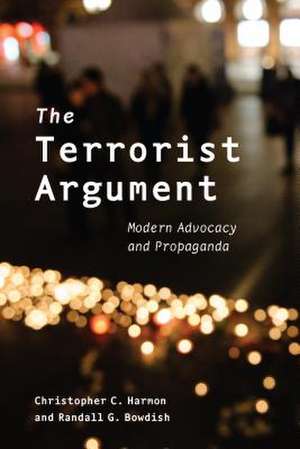The Terrorist Argument
Autor Christopher C. Harmon, Bowdish, Randall G.en Limba Engleză Paperback – 29 oct 2017
From chants and pamphlets to the Internet, terrorist propaganda can be deadly effective
Propaganda used by terrorists and armed groups might not always be the most sophisticated or nuanced form of rhetoric, but with the right mix of emotion and logic it can be extremely effective in motivating supporters and frightening opponents. This book examines how terrorist groups in recent history have used propaganda, and how they had adapted to new communications technologies while retaining useful techniques from the past.
Harmon and Bowdish trace how armed groups and terrorists around the globe have honed their messages for maximum impact, both on the communities they hope to persuade to support them and on the official state organs they hope to overthrow. Sometimes both the messages and the techniques are crude; others are highly refined, carefully crafted appeals to intellect or emotion, embracing the latest forms of communications technology. Whatever the ideas or methodology, all are intended to use the power of ideas, along with force, to project an image and to communicate--not merely intimidate.
The Terrorist Argument uses nine case studies of how armed groups have used communications techniques with varying degrees of success: radio, newspapers, song, television, books, e-magazines, advertising, the Internet, and social media. It is fascinating reading for anyone interested in civil conflict, terrorism, communications theory and practice, or world affairs in general.
Preț: 321.56 lei
Nou
61.53€ • 67.05$ • 51.85£
Carte tipărită la comandă
Livrare economică 23 aprilie-07 mai
Specificații
ISBN-10: 081573218X
Pagini: 325
Dimensiuni: 152 x 229 x 25 mm
Greutate: 0.5 kg
Editura: BROOKINGS INSTITUTION
Textul de pe ultima copertă
From chants to pamphlets to the internet, terrorist propaganda can be deadly effective
The Terrorist Argument examines how terrorists and armed groups have used communications techniques with varying degrees of success: radio, newspapers, voice and song, television, books, e-magazines, advertising, the internet, and social media. Armed groups engaging in terrorism have always relied on media to motivate supporters and frighten opponents, and they have proven adept at adapting to new communications technologies while retaining useful techniques from the past.
Here, the authors trace how armed groups and terrorists around the globe have honed their broadcasts for maximum impact on those from whom they seek support and on the official state organs they hope to overthrow. While sometimes crude, the messages and the techniques can also be highly refined--carefully crafted appeals to intellect or emotion, embracing the latest forms of communications technology.
Fascinating reading for anyone interested in civil conflict, terrorism, communications theory and practice, or security studies, The Terrorist Argument helps shed light on the myriad ways terrorist propaganda has become such an effective tool in the digital age.
/div>Notă biografică
Cuprins
Contents:
Introduction
1. Terrorist Propaganda and Argument
2. Radio: The Voice of Fighting Algeria
3. Voice and Lyrics: The New People's Army of Troubadours
4. Newspaper: The Irish People
5. Television: Hezbollah's Al-Manar
6. Internet: Militancy and Ecotage
7. The Book: Islamist Strategy for the Post-bin Laden Era
8. Advertising: The People's Mujahideen e Khalq
9. The E-Magazine: Al-Qaeda's Inspire
10. Social Media: The Islamic State's Multimedia Blitzkrieg
Conclusions: A Contest of Ideas
Notes
Index
